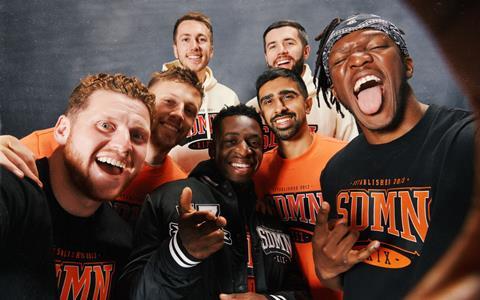Next 12 months set to be dominated by M&A, YouTube, AI and brands

It has been another turbulent year for those in the TV industry, with the business of delivering shows to viewers coming under huge pressure around the world.
Fundamentally, the issue is one of over-supply. Audiences have more things to watch in more places than ever before, meaning those who create, produce and monetise content have to fight harder for diminishing returns.
It would be remiss to presuppose that no one is making money in this emergent landscape, though.
Nimble, cost-efficient producers are using YouTube to deliver unscripted hits to younger audiences; brands are being courted to support budgets; tentpole scripted fare retains its allure; and the AI experiment continues. The industry is evolving and fast.
So, as Broadcast International embarks on its Christmas break from the end of today, we look ahead to what will be making the headlines in 2025.
More M&A
The influx of private equity-backed groups over the past couple of years looks likely to continue to fuel the M&A machine in 2025.
A raft of production entities of all sizes could be poised for action in one way or another over the next 12 months, reflecting the safe harbour that being part of larger, more diversified group can provide.

And the aforementioned private equity money that has backed companies such as All3Media and The North Road should grease the wheels of such deals.
Slow Horses and The King’s Speech producer See-Saw Films is one of the blue chip assets exploring investment or a sale, as revealed by Broadcast in November, while RTL Group has also been looking at a potential merger for its production and distribution giant Fremantle.
European production group Federation Studios, which owns more than 30 labels including Britannia producer Vertigo Films and Italy’s Fabula Pictures, is another to have formally appointed advisors, as Broadcast revealed last month.
Then there’s ITV Studios, which could also find itself on the block if reports of early stage discussions are confirmed, with interested parties ranging from All3 owner RedBird IMI and KKR-backed Mediawan to France’s TF1 Group. Just how the debut of Canal+ affects valuations, however, remains to be seen.
Turning to YouTube
Unlike many traditional broadcast groups around the world, the global streamers have been relatively quick to cotton onto YouTube’s youthful allure.
Prime Video has just debuted the first season of Beast Games, a not-so-subtle attempt to pull in a new audience by partnering with the Google-owned service’s megastar, Mr Beast (aka James Stephen “Jimmy” Donaldson), on a reality competition that offers a $5m prize.
There has been much talk over recent years of the importance of IP and talent to cut through the noise, but turning to the likes of Mr Beast (and his 337 million YouTube subscribers) looks likely to be the shape of things to come.

Netflix, of course, isn’t about to be left behind and it recently secured its own YouTube megastars in the shape of The Sidemen with an intriguing deal for their reality show Inside.
The group launched the long-form series earlier this year on YouTube, which sees 10 influencers and reality stars confined to a house for a week, competing in challenges in a bid to win £1m.
Netflix has bagged exclusive rights to a second season, to be produced by Cowshed Collective, while a US remake is also in the works – a neat example of format industry evolution in action.
And as Cowshed Collective co-founder and chief exec George Cowin told Broadcast International, “just because we are making content that lives on digital or social initially does not mean we are not working with those that are the best at their craft.
“What it does mean, given that our background is in social and digital, is that we are able to be quicker, more nimble and more efficient; and now we are doing it at a bigger scale to reach bigger audiences.”
Breaking out the brands
Brand-funded content is not new but the money it can provide is now needed more than ever.
That’s why producers – or at least those on the financing side – are looking at this side of the industry to provide far bigger returns in 2025.
Speak to anyone deeply involved in the sector and they’ll tell you that this is no easy business, however. Advertisers must be persuaded and some content lends itself to brand funding more than others.

But what is clear is that the industry is looking hard at all ways to provide solutions to the ad world’s demands. Amazon MGM Studios, for one, plans to deepen its partnerships with brands: Lauren Anderson, head of brand and content innovation, said it wanted to “build original content…together” and is “going deeper on the partnerships.”
And while entry-level solutions such as product placement may work for some brands and shows, it’s clear the thinking is now going far deeper, with a focus on “integration” and ensuring products can “be a story point”.
“There’s more interest in this, you have to get really ahead of timelines. You won’t see as many integrations from us right now because it takes time, but you will see more. There are plenty of ways to marry your brand with content.”
Calling all coproductions
Coproductions look likely to be more necessary than ever in 2025 but it is not immediately clear how streamers will factor into this equation.
While global operators might talk of increased flexibility when it comes to rights, the annual TV Exports Report from UK trade body Pact told a different story.
Revenues from co-productions for UK producers sank from £167m to £120m, a drop of 28%, with the report reflecting the “very clear retreat from the market by US Media”, with streaming majors Amazon Prime, Max and Netflix noticeably turning off the co-pro tap, according to the report.

“The drop in overall revenues is likely to be very sensitive to the reduction in activity – especially premium drama – by some of the large US media companies that have partnered with [UK] companies in previous years,” the report stated.
Yet costs, especially on scripted, are not deflating and commissioning fees are not increasing. While activity in the UK might have been muted, across Europe, coproduction (or pre-sale) clubs such as the New8 - which is behind upcoming Finnish show Queen of Fucking Everything - are showing the model can work.
There also looks set to be new players entering the copro space: Turkish drama continues to be a global bestseller but local economic conditions are making the models behind those shows increasingly tricky. Speak to producers and distributors, and finding copro partners is top of mind in 2025.
Unpacking AI’s remit
Just where the future of AI lies for those producing content is a work in progress, but there seems agreement that the tech has huge benefits when it comes to performing the more mundane tasks around production.

That will likely affect entry level jobs, however, with myriad long term implications, but it is AI’s role in the creative process that will likely be top of mind over the next 12 months.
Issues around copyright and training the new wave of AI software are coming to a head, with consultations being planned and trade bodies becoming increasingly vocal.
The UK government, for one, recently said it is seeking views on how to ensure the country’s legal framework for AI and copyright supports both the creative industries and the fast-growing AI sector.
A consultation on the usage of copyrighted materials to train AI models is being carried out, with a proposal that an exception to copyright law could be introduced while allowing rights holders to reserve their right to control the use of their content.
Yet this issue is at once both a local and international conundrum – so expect 2025 to provide plenty more headlines on the topic but also perhaps some joined up thinking as countries compare and contrast their options.







No comments yet